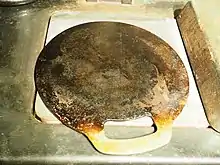
A bakestone is a type of griddle, particularly associated with Wales, where they are used for cooking Welsh cakes.[1][2]
Before the 19th century, bakestones were made of stone; usually oval and of schistose steatite (soapstone), slate or very fine micaceous flaggy sandstone about 1+1⁄2 inches (4 cm) thick.[3][4] Modern bakestones are usually circular with a cut-out handle and are made of cast iron or steel, approximately 1 cm (0.4 in) thick. In Lancashire and the West Riding of Yorkshire the spelling is bakstone and are primarily used to cook very thin, yeasted oatcakes or riddle bread.[3]
New bakestones are seasoned by burning a mixture of lard or oil and salt, giving a non-stick surface and protecting against rust. The blackened surface is not removed when the bakestone is cleaned and bakestones are believed to improve with repeated use.[5]
References
- ↑ Barraud, Winifred K. (9 November 1962). "Bakestone tradition". The Guardian. London. p. 8.
- ↑ "Welsh Bakestone Or Planc". Antique Kitchenalia. Archived from the original on 10 August 2015. Retrieved 9 November 2013.
- 1 2 Hartley, Marie; Ingilby, Joan (1968). Life and Tradition in the Yorkshire Dales. London: J. M. Dent & Sons Ltd. ISBN 0498076687.
- ↑ Mahler, Ditlev; Baug, Irene (2018). Gruel, Bread, Ale and Fish. Copenhagen, Denmark: The National Museum of Denmark. pp. 61–78. ISBN 9788776023645.
- ↑ "Seasoning A Bakestone". Antique Kitchenalia. Archived from the original on 11 August 2015.